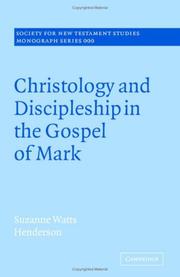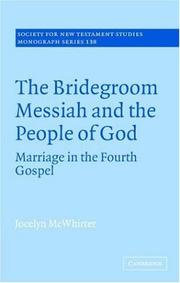| Listing 1 - 2 of 2 |
Sort by
|

ISBN: 0521859069 052109139X 1107156254 0511191626 0511161867 0511313268 0511487983 1280458801 0511160569 0511161131 9780511161865 9780511191626 9780511160561 9780511161131 9780511487989 9780521859066 9781107156258 9781280458804 9780511313264 9780521091398 Year: 2006 Volume: 135 Publisher: Cambridge : Cambridge University Press,
Abstract | Keywords | Export | Availability | Bookmark
 Loading...
Loading...Choose an application
- Reference Manager
- EndNote
- RefWorks (Direct export to RefWorks)
Exploring the interrelated topics of Christology and discipleship within the apocalyptic context of Mark's Gospel, Henderson focuses on six passages: Mark 1:16-20; 3:13--15; 4:1-34; 6:7-13; 6:32-44; 6:45-52. Together, these passages indicate that the disciples failed to understand not just Jesus' messianic identity per se but the apocalyptic nature of his messiahship, as well as its implications for their own participation in God's coming reign. The implications of this for Mark's gospel as a whole are to situate Mark's Christological claims within the broader context of the apocalyptic 'gospel of God'. This lends coherence to Mark's bifocal interest in miracle and passion. It also illuminates the relationship between Mark's Jesus and his followers as those who carry forward his own mission: to demonstrate the coming kingdom of God, which is fully assured if not yet fully in view.
Apostelen --- Apostles --- Apôtres --- Disciples [Twelve] --- Christian life --- Biblical teaching. --- Jesus Christ --- Person and offices --- Bible --- Criticism, interpretation, etc --- 226.3 --- 225*2 --- Evangelie volgens Marcus --- Jezus Christus in het Nieuwe Testament: christologie --- 225*2 Jezus Christus in het Nieuwe Testament: christologie --- Biblical teaching --- Christ --- Cristo --- Jezus Chrystus --- Jesus Cristo --- Jesus, --- Jezus --- Christ, Jesus --- Yeh-su --- Masīḥ --- Khristos --- Gesù --- Christo --- Yeshua --- Chrystus --- Gesú Cristo --- Ježíš --- Isa, --- Nabi Isa --- Isa Al-Masih --- Al-Masih, Isa --- Masih, Isa Al --- -Jesus, --- Jesucristo --- Yesu --- Yeh-su Chi-tu --- Iēsous --- Iēsous Christos --- Iēsous, --- Kʻristos --- Hisus Kʻristos --- Christos --- Jesuo --- Yeshuʻa ben Yosef --- Yeshua ben Yoseph --- Iisus --- Iisus Khristos --- Jeschua ben Joseph --- Ieso Kriʻste --- Yesus --- Kristus --- ישו --- ישו הנוצרי --- ישו הנצרי --- ישוע --- ישוע בן יוסף --- المسيح --- مسيح --- يسوع المسيح --- 耶稣 --- 耶稣基督 --- 예수그리스도 --- Jíizis --- Yéshoua --- Iėsu̇s --- Khrist Iėsu̇s --- عيسىٰ --- Person and offices. --- Bible. --- Marco (Book of the New Testament) --- Mark (Book of the New Testament) --- Markus (Book of the New Testament) --- Markusevangelium --- Vangelo di Marco --- Criticism, interpretation, etc. --- Bible. N.T. Mark --- عيسىٰ --- Book of Mark --- Arts and Humanities --- Religion

ISBN: 0521864259 9780521864251 9780511488085 9780521090223 9780511349799 0511349793 0511348894 9780511348891 0511488084 0521090229 1107169372 1281085863 9786611085865 0511347944 1139132040 0511350694 Year: 2006 Volume: 138 Publisher: Cambridge : Cambridge University Press,
Abstract | Keywords | Export | Availability | Bookmark
 Loading...
Loading...Choose an application
- Reference Manager
- EndNote
- RefWorks (Direct export to RefWorks)
Many interpreters of the Fourth Gospel detect allusions to biblical texts about marriage, but none offers a comprehensive analysis of these proposed allusions or a convincing explanation for their presence. Building on the work of Richard Hays, Donald Juel and Craig Koester, in this 2006 book Jocelyn McWhirter argues that John alludes to biblical texts about marriage in order to develop a metaphor for Jesus and how he relates to his followers. According to McWhirter, John chooses these texts because he uses a first-century exegetical convention to interpret them as messianic prophecies in light of an accepted messianic text. Specifically, he uses verbal parallels to link them to Psalm 45, a wedding song for God's anointed king. He then draws on them to portray Jesus as a bridegroom-Messiah and to depict Jesus' relationship with his followers in terms of marriage.
Marriage --- Biblical teaching. --- 226.5 --- Evangelie volgens Johannes --- Biblical teaching --- Jesus Christ --- Christ --- Cristo --- Jezus Chrystus --- Jesus Cristo --- Jesus, --- Jezus --- Christ, Jesus --- Yeh-su --- Masīḥ --- Khristos --- Gesù --- Christo --- Yeshua --- Chrystus --- Gesú Cristo --- Ježíš --- Isa, --- Nabi Isa --- Isa Al-Masih --- Al-Masih, Isa --- Masih, Isa Al --- -Jesus, --- Jesucristo --- Yesu --- Yeh-su Chi-tu --- Iēsous --- Iēsous Christos --- Iēsous, --- Kʻristos --- Hisus Kʻristos --- Christos --- Jesuo --- Yeshuʻa ben Yosef --- Yeshua ben Yoseph --- Iisus --- Iisus Khristos --- Jeschua ben Joseph --- Ieso Kriʻste --- Yesus --- Kristus --- ישו --- ישו הנוצרי --- ישו הנצרי --- ישוע --- ישוע בן יוסף --- المسيح --- مسيح --- يسوع المسيح --- 耶稣 --- 耶稣基督 --- 예수그리스도 --- Jíizis --- Yéshoua --- Iėsu̇s --- Khrist Iėsu̇s --- عيسىٰ --- Messiahship. --- Bible. --- Jean (Book of the New Testament) --- Johanisi (Book of the New Testament) --- Johannesevangelium --- John (Book of the New Testament) --- Yohan pogŭm --- Yohane den (Book of the New Testament) --- Yūḥannā (Book of the New Testament) --- Criticism, interpretation, etc. --- Ioganaĭ (Book of the New Testament) --- Иоганай (Book of the New Testament) --- Arts and Humanities --- Religion --- Marriage - Biblical teaching.
| Listing 1 - 2 of 2 |
Sort by
|

 Search
Search Feedback
Feedback About
About Help
Help News
News